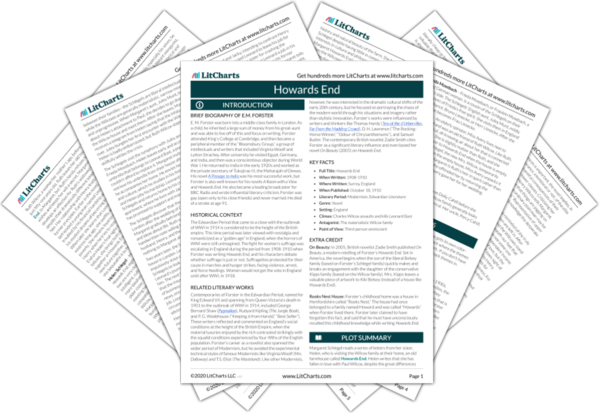The symbolism of books in Howards End is far from straightforward. On one hand, the deeply-read Schlegel sisters, Margaret and Helen, demonstrate greater empathy and more profoundly critical thinking than most of their counterparts. The Wilcoxes, for example, are fond of sporting and little else, and lack imagination and compassion. On the other hand, Forster suggests that books can only teach one so much about the world—they often speak to a narrow experience, and fail to substantially engage with the issues and conditions faced by the masses. Leonard Bast glorifies great literature and art, and regards high culture as essential to improving his bleak life. Yet Forster critiques these “great” writers for writing in a highly romantic mode that neglects to address life’s ugly realities. Leonard turns to an author he considers to be “the greatest master of English Prose” for insight, but struggles to connect with the text: “And the voice in the gondola rolled on, piping melodiously of Effort and Self-Sacrifice, full of high purpose, full of beauty, full even of sympathy and the love of men, yet somehow eluding all that was actual and insistent in Leonard’s life. For it was the voice of one who had never been dirty or hungry, and had not guessed successfully what dirt and hunger are.”
Literature that is fundamentally estranged from real life serves less of a purpose than literature that engages with the true human condition. Likewise, reading by itself does not automatically cause one’s worldview or judgment to evolve—one must also acquire the confidence and the expertise to fully understand the text and actively consider how it applies to one’s own life. Leonard impresses the Schlegels not with his ability to repeat ideas that he has read in books, but with his spontaneous effort to think for himself and spend a night out walking the streets and roaming the woods instead of keeping to the safety of his bed: “[T]hrough the mists of his culture came a hard fact, hard as a pebble. ‘I walked all the Saturday night,’ said Leonard. ‘I walked.’ A thrill of approval ran through the sisters.” The Schlegels try to cultivate this independent streak in Leonard, but insecure as he is about his lack of higher education and worldly experience, he fails to grasp that his original thoughts could be of any real value. In the end, books cannot save Leonard from his tragic fate—he clutches at a bookshelf as he staggers under Charles Wilcox’s blows, but it topples over and flattens him, instead. His heart stops amidst an avalanche of his beloved books.
Books Quotes in Howards End
And the voice in the gondola rolled on, piping melodiously of Effort and Self-Sacrifice, full of high purpose, full of beauty, full even of sympathy and the love of men, yet somehow eluding all that was actual and insistent in Leonard’s life. For it was the voice of one who had never been dirty or hungry, and had not guessed successfully what dirt and hunger are.
…[Leonard’s] outburst ended in a swamp of books. No disrespect to these great names. The fault is ours, not theirs. They mean us to use them for sign-posts, and are not to blame if, in our weakness, we mistake the sign-post for the destination. And Leonard had reached the destination. He had visited the county of Surrey when darkness covered its amenities, and its cosy villas had re-entered ancient night. Every twelve hours this miracle happens, but he had troubled to go and see for himself. Within his cramped little mind dwelt something that was greater than Jefferies’ books—the spirit that led Jefferies to write them.
“It is so slurred over and hushed up, there is so little clear thinking…so few of us think clearly about our own private incomes, and admit that independent thoughts are in nine cases out of ten the result of independent means. Money: give Mr. Bast money, and don’t bother about his ideals. He’ll pick up those for himself.”
“I shall never get work now. If rich people fail at one profession, they can try another. Not I. I had my groove, and I’ve got out of it. I could do one particular branch of insurance in one particular office well enough to command a salary, but that’s all. Poetry’s nothing, Miss Schlegel. One’s thoughts about this and that are nothing. Your money, too, is nothing, if you’ll understand me. I mean if a man over twenty once loses his own particular job, it’s all over with him. I have seen it happen to others. Their friends gave them money for a little, but in the end they fall over the edge. It’s no good. It’s the whole world pulling. There always will be rich and poor.”












